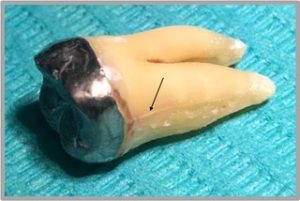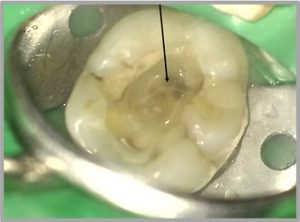Reasons Why You Should Never Ignore A Cracked Tooth
What is a cracked tooth?
A cracked tooth is an incomplete fracture of the tooth that often manifests as “cracked tooth syndrome”. This is characterized by sharp pain triggered when chewing (biting or release) of tough, grainy foods and heightened sensitivity to hot or cold temperatures. Oftentimes, the pain is erratic and it may be difficult for your dentist to localize the tooth causing the discomfort.
When the crack has propagated into the pulp space, more severe symptoms such as spontaneous toothache at night and swelling or pus may result.
Diagnosing Cracked Teeth
The provisional diagnosis of a cracked tooth has to be affirmed before any definitive treatment is prescribed. Diagnosing a cracked tooth is more complex than detecting a decayed tooth due to various confounding signs and symptoms. It requires a thorough understanding of the patient’s pain history as well as a detailed clinical examination of the tooth. Endodontists have the expertise and equipment to carry out clinical investigation of cracked teeth to determine the most appropriate course of treatment.
Cuspal Protection of Cracked Teeth
The type of treatment for cracked teeth depends on the patient’s signs and symptoms, risk factors and extent and location of the crack.
The hard tissues of a tooth have no regenerative capacity. Thus, a crack in the tooth cannot heal by itself. Elimination or removal of the crack through drilling is also not an option as it will only exacerbate the condition of the tooth. The aim of cracked tooth treatment is to mechanically control the crack and prevent its progression. The only way to control a crack is to place a crown over the cracked tooth. A crown is a rigid prosthesis that covers the tooth to brace and protect it from further crack progression.

A picture of an extracted tooth with a crack seen on the root
For cracked teeth with mild and reversible symptoms, an option of crowning the tooth without root canal treatment may be possible. In such cases, a metal band is used to simulate a crown and it is temporarily placed around the tooth. If the symptoms upon biting are alleviated, the band may be replaced by a crown without the need for root canal treatment.
Root Canal Treatment of Cracked Teeth
Root canal treatment will be required if the tooth presents with severe and persistent signs or symptoms that are not alleviated with banding or crowning. The patient can have persistent symptoms with biting and have severe sensitivity to cold and hot. In some advanced cases, the pulp may be irreversibly damaged due to bacterial progression through the pathway of the crack and the root canal space infected, leading to swelling or abscess formation.
Root canal treatment aims to remove the inflamed or infected pulp from the tooth. During the root canal treatment procedure, the crack can be visualized internally under high magnification using a microscope. This allows the Endodontist to perform a crack assessment to determine the severity of the crack. The deeper the extent of the crack, the poorer the prognosis of the tooth. Following the crack assessment, the Endodontist will present and discuss the objective findings to the patient and an informed decision can be made by the patient after weighing the pros and cons of retaining the cracked tooth. If the patient opts to retain the cracked tooth, completion of root canal treatment will be planned and followed by a crown.

A clinical picture of a tooth during treatment.
Alternative Options for Cracked Teeth
When the crack is too deep and the tooth prognosis deemed poor, extraction will be presented as an alternative option. In spite of cuspal protection from the crown, a tooth with a deep crack may still continue to crack and eventually lead to vertical root fracture. Hence, extraction of teeth with deep and unrestorable cracks is a viable option. After the extraction, a discussion can be made with the dentist regarding possible tooth replacement options – such as implant-supported prosthesis, bridge or removable denture.
Final Advice About Cracked teeth
A cracked tooth diagnosis can be elusive and requires a multi-disciplinary team consisting of an Endodontist and the General Dentist to confirm the diagnosis and treat the tooth. With function and time, a crack on a tooth will propagate further. However, if the cracked tooth is diagnosed and treated promptly, the tooth will have a reasonable long-term prognosis.
